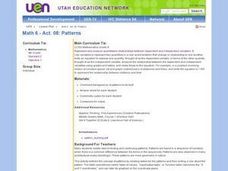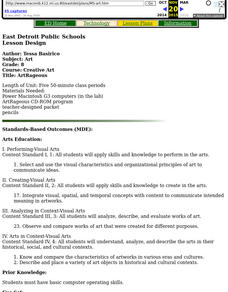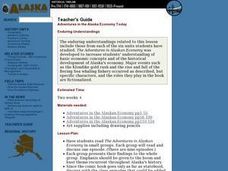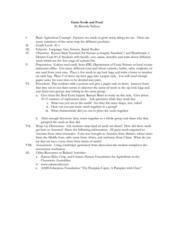Curated OER
Schools for Sale
Students differentiate between public and private goods. They analyze and evaluate various and positions on a public issue. They establish decision-making criteria. They develop a public policy based on a formal decision making model.
Curated OER
Horton Hears a Who
Students explore the ways that communities work in the story Horton Hears a Who and compare that to the community in which they live.
Curated OER
Math 6 - Act. 08: Patterns
Sixth graders use centimeter cubes to build structures and then compare and contrast the patterns they see.
Curated OER
Economics Using SimCity 2000
Fifth graders build a city and balance a budget for the population.
Curated OER
Art Rageous
Eighth graders research and investigate the following topics: color, light, perspective, composition, and artists' styles and lives. A class discussion of the different topics follows.
Curated OER
#22c Airplane flight #22d Airplane flight--How High? How Fast?
Students discuss the application of frames of reference to an airplane flying with a constant velocity v through the air.
Curated OER
Adventures in the Alaska Economy Today: Enduring Understandings
Pupils research the campaign to win statehood for Alaska and the constitution which was in place before statehood was approved.
Curated OER
Phytochemicals
Students identify song style and form. They create movement which shows the song form and improvise rhythm accompaniment.
Curated OER
What We Leave Behind
Young scholars analyze primary source documents from the 1830's. They examine how records, memoirs and artifacts preserve history and discuss what should be placed in a time capsule for future generations.
Curated OER
What Would You Do?
Learners study major religions and determine how and why an individual who held each of these beliefs would respond to a similar crisis.
Curated OER
Classifying Rights From Various Constitutions
Students examine classification categories of rights: liberty, security, cultural and group rights using worksheets. They analyze the constitutions of five countries of the Pacific Rim while looking at the rights that are included in them.
Curated OER
The Senate : Retention, Abolition, Reform
Young scholars examine the strengths and weaknesses of the Senate in the Canadian Parliament. The role of the Senate is probed as its usefulness is scrutinized.
Curated OER
Dr. Seuss: Horton Hears a Who?
Second graders listen to Horton Hears a Who? and complete a study of word cooperation. They group the words into families to see chunking.
Curated OER
Grain Seeds and Food
Students observe the characteristics of different seed types. They classify, sort, name and write about the seeds.
Curated OER
Unit on Globalization and Foreign Investment
Twelfth graders examine the role of investment in an economy. They compare and contrast the different types of foreign investments. They also examine the differences between foreign direct investments and foreign portfolio investments.
Curated OER
Why Are Some Nations Wealthy?
Pupils, in groups, examine data from several nations regarding size, natural resources, and population. Using these data, they rank the nations, try to identify them, and predict whether each nation is rich or poor.
Curated OER
Realism In Chinese Art
Learners examine the artistic terms realism and idealism through the study of Chinese art and artifacts in this lesson for the Social Studies classroom. Evaluation is accomplished through an in-class essay.
Curated OER
Fish Diseases
Students discuss sicknesses they have had or come in contact with. They discuss treatments for the diseases on the list. Students discuss illnesses that fish might get along with the symptoms, behavior and treatment.
Curated OER
Song Allouette - Oneida
Students practice singing the song Allouette. They discuss the meaning in both the English and Oneida languages and how the words to this song demonstrate important feelings for the Oneida people.
Curated OER
Ta he thaw nu ha la tu-Traditional Oneida Song
Students practice singing a traditional Oneida song. They discuss the meaning in both the English and Oneida languages and how the words to this song demonstrate important feelings for the Oneida people.
Curated OER
Do Immigrants Benefit Economically and Socially By Coming to the USA?
Learners research positive and negative economic and social aspects of immigration to the United States, and present their research findings in either role play or debate format.
Curated OER
ESOL Families and Schools
Students discuss how the U.S. educational system is similar and different to their native country's educational system. They chart the different educational levels and why parental involvment is so important. They generate a list of...
Curated OER
Water Regulations and Policies
Students discuss, examine and review copies of their local Water Quality Reports. They discuss state laws regarding water quality regulations and how water planning groups decisions impact aquifers. They describe the pros and cons of the...
Curated OER
Looking and Learning in the Art Museum
Students take a trip to the local art museum. They discuss an artist's use of the elements of art in a work of art. Students are explained the difference between looking at a reproduction of work of art and looking at the original. ...

























